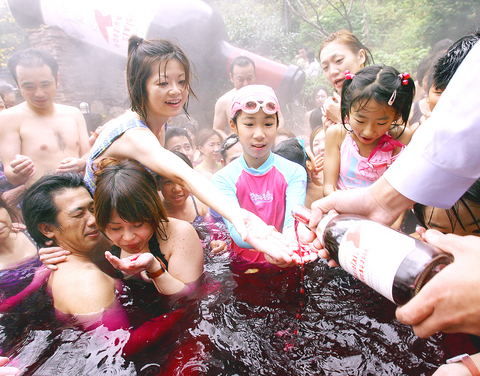The Japanese like Beaujolais Nouveau wine so much they're swimming in it ... literally.
A hot spring spa resort in Hakone, a resort region near Japan's celebrated Mount Fuji, is pouring the fruity red wine into one of its pools until Sunday to celebrate the release of this year's product.
The Hakone Kowakien Yunessun has invited a French sommelier to come to Japan to pour a dozen bottles of the Beaujolais Nouveau, produced by France's Cordier, into its open-air "wine spa" every day.

PHOTO: AFP
"We installed the wine spa last year, and conducted the Beaujolais Nouveau celebration. It was a great success," said Seiji Sanada, an official at Yunnesun.
"The aroma of Beaujolais is very pleasing, very nice. From the open-air spa, you can see the mountains, leaves turning color and hear the sound of a nearby ravine. It's very pleasant," he said.
Yesterday when officials in the "wine spa" poured the Beaujolais Nouveau into the bath, people enjoyed catching the wine falling through the air with their hands and tasting it, while soaking in the bath at the same time.
Japan is the biggest importer of Beaujolais Nouveau, with the wine sold everywhere from fine restaurants to convenience stores.
Even though beer and Japanese sake remain far more popular than wine, Beaujolais Nouveau has become a seasonal fad in Japan which this year ordered a record 11 million bottles.
Sanada insisted that the Beaujolais bath had real value.
Wine smoothens the skin and its aroma relaxes the mind, he said.
The company said bathing in wine is "a rejuvenation treatment."
"It has been said that the Queen of Egypt, Cleopatra, loved to bath in wine," said a company release.
Japan is dotted by natural springs, or onsen, where people kick back and soak in steamy hot water.
ALCOHOL COULD DAMAGE YOUR HEALTH

PREPAREDNESS: Given the difficulty of importing ammunition during wartime, the Ministry of National Defense said it would prioritize ‘coproduction’ partnerships A newly formed unit of the Marine Corps tasked with land-based security operations has recently replaced its aging, domestically produced rifles with more advanced, US-made M4A1 rifles, a source said yesterday. The unnamed source familiar with the matter said the First Security Battalion of the Marine Corps’ Air Defense and Base Guard Group has replaced its older T65K2 rifles, which have been in service since the late 1980s, with the newly received M4A1s. The source did not say exactly when the upgrade took place or how many M4A1s were issued to the battalion. The confirmation came after Chinese-language media reported

The Taiwanese passport ranked 33rd in a global listing of passports by convenience this month, rising three places from last month’s ranking, but matching its position in January last year. The Henley Passport Index, an international ranking of passports by the number of designations its holder can travel to without a visa, showed that the Taiwan passport enables holders to travel to 139 countries and territories without a visa. Singapore’s passport was ranked the most powerful with visa-free access to 192 destinations out of 227, according to the index published on Tuesday by UK-based migration investment consultancy firm Henley and Partners. Japan’s and

A Ministry of Foreign Affairs official yesterday said that a delegation that visited China for an APEC meeting did not receive any kind of treatment that downgraded Taiwan’s sovereignty. Department of International Organizations Director-General Jonathan Sun (孫儉元) said that he and a group of ministry officials visited Shenzhen, China, to attend the APEC Informal Senior Officials’ Meeting last month. The trip went “smoothly and safely” for all Taiwanese delegates, as the Chinese side arranged the trip in accordance with long-standing practices, Sun said at the ministry’s weekly briefing. The Taiwanese group did not encounter any political suppression, he said. Sun made the remarks when

BROAD AGREEMENT: The two are nearing a trade deal to reduce Taiwan’s tariff to 15% and a commitment for TSMC to build five more fabs, a ‘New York Times’ report said Taiwan and the US have reached a broad consensus on a trade deal, the Executive Yuan’s Office of Trade Negotiations said yesterday, after a report said that Washington is set to reduce Taiwan’s tariff rate to 15 percent. The New York Times on Monday reported that the two nations are nearing a trade deal to reduce Taiwan’s tariff rate to 15 percent and commit Taiwan Semiconductor Manufacturing Co (TSMC, 台積電) to building at least five more facilities in the US. “The agreement, which has been under negotiation for months, is being legally scrubbed and could be announced this month,” the paper said,